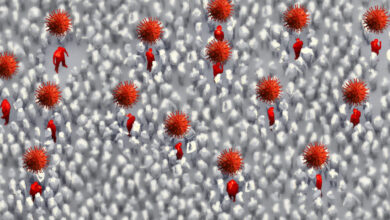Six Ways Fluvoxamine May Act To Prevent Severe Covid-19

Portrait of younger athlete leaping over a hurdle throughout coaching on race monitor.
getty
A current meta-analysis of a small variety of fluvoxamine efficacy trials enrolling simply over 2,000 sufferers discovered that fluvoxamine reduces the probabilities of extreme hospitalization by as much as 95%. If this efficacy is maintained in bigger research, fluvoxamine could possibly be an vital element of the Check-to-Deal with technique that the US is within the strategy of rolling out.
Fluvoxamine was not developed as an anti-COVID drug. It has lengthy been used as a mood-stabilizing selective serotonin reuptake inhibitor (SSRI) and is now obtainable as an affordable generic drug worldwide.
Hallmarks of Extreme Covid
The obvious effectiveness of fluvoxamine raises the query of the way it may act independently of its use as a temper stabilizer. The next evaluate by Sukhatme et al. supplies particulars of the potential mechanisms by which fluvoxamine has the potential to intrude with probably the most extreme penalties of COVID 19 an infection, together with cytokine storms, coagulation, and hyperinflammation.
FIGURE 1: Fluvoxamine acts independently to inhibit a number of of the pathways which can be attribute … [+]
ACCESS Well being Worldwide
There are six recognized mechanisms, doubtlessly extra, by which fluvoxamine could act to deal with late-stage Covid and stop late-stage sequela: discount In platelet aggregation, decreased mast cell degranulation, interference with endolysosomal viral trafficking and membrane binding, sigma-1 receptor exercise, and elevated melatonin ranges.
FIGURE 2: Potential anti-COVID-19 mechanisms of motion of fluvoxamine, together with discount of … [+]
Sukhatme et al.
Inhibition of Cytokine Storm: Decreased Mast Cell Degranulation
The cytokine storm is a life-threatening systemic inflammatory syndrome involving elevated ranges of circulating cytokines and immune-cell hyperactivation. Basically, that is the alarm bell in your immune system as soon as a harmful pathogen is detected, sending immune defenses to battle off the invader and leading to extreme signs.
One of many main triggers of the cytokine storm is the interplay between SARS-CoV-2 and human mast cells, which are sometimes viral reservoirs for RNA viruses. Pulmonary tissues within the lungs of deceased Covid sufferers are sometimes linked to activated mast cells, that are degranulated by viruses upon an infection.
Fluvoxamine additionally interacts with mast cells, lowering mRNA ranges of protease-1, which promotes mucosal permeability in intestinal allergic hypersensitivity reactions. This seemingly impacts the effectivity of interplay between the virus and mast cells, resulting in much less extreme cytokine storm responses and signs. Subsequently, fluvoxamine has the potential to cut back the cytokine storm pathway of extreme SARS-CoV-2 an infection.
Inhibition of Coagulation: Discount In Platelet Aggregation
Coagulation is the thickening of the blood because of blood platelets aggregating. This may increasingly result in bloodstream points like hypertension. Though platelets don’t produce serotonin, they do take in and comprise excessive concentrations of the chemical. When aggregating within the bloodstream, platelets launch serotonin to facilitate hemostasis.
Fluvoxamine inhibits the uptake of serotonin from platelets and subsequently inhibits platelet aggregation. Fluvoxamine is a serotonin uptake inhibitor and inhibits serotonin focus in platelets previous to clot formation. A 2011 study confirmed that sufferers taking SSRIs measured decrease ranges of coagulation than those who weren’t taking the medication. Subsequently, fluvoxamine has the potential to cut back the coagulation pathway of extreme SARS-CoV-2 an infection.
Inhibition of Hyperinflammation: Sigma-1 Receptor Exercise
Hyperinflammation following coagulation causes quite a lot of well being points, together with joint ache, gastrointestinal points, and in some instances, mind damage. One participant in irritation is the sigma-1 receptor, which regulates endoplasmic reticulum mitochondrial calcium ion signaling, leading to pro-inflammatory responses in greater concentrations.
Fluvoxamine upregulates interleukin-10 (IL-10), which is an anti-inflammatory protein. The sigma-1 receptor downregulates different interleukins, equivalent to IL-6 and IL-8, however not IL-10. Subsequently excessive ranges of IL-10 can inhibit the sigma-1 receptor and its hyperinflammatory processes. In different phrases, fluvoxamine could cut back Covid-related hyperinflammation.
Oblique Mechanisms: Endolysosomal Viral Trafficking And Membrane Binding
SARS-CoV-2, together with different beta-coronaviruses, use lysosomal trafficking to flee contaminated cells. Lysosomes break down worn-out cell constructions in a course of referred to as apoptosis, which the virus makes use of as a method of leaving one contaminated cell to seek out one other.
Fundamental SSRIs like fluvoxamine truly hinder lysosomes by interfering with their cost and decreasing their membrane-crossing effectivity. This may increasingly not influence the virus itself, nevertheless it impedes certainly one of its main routes of escape, leading to antiviral results that would make prolonged infections tougher.
We additionally word that lysosomotropic medication additionally influence viral entry of the SARS-CoV-2. Whereas fluvoxamine has not been examined particularly for this characteristic, it has an anti-lysosome operate, which means it might additionally influence viral entry.
Inhibition of Hyperinflammation: Elevated Melatonin Ranges
Fluvoxamine elevates melatonin ranges by the inhibition of the enzyme CYP1A2, which is concerned within the metabolization of polyunsaturated fatty acids. Some CYP1A2 reactions lead to elevated blood strain and promoted irritation responses. Melatonin mitigates irritation from the NLRP3 pathway, a standard instrument for SARS-CoV-2. Fluvoxamine, subsequently, could cut back Covid-related hyperinflammation.
Though it’s nonetheless early days, given the comparatively restricted trials fluvoxamine has been proven prevention of great COVID, the outcomes already look promising. Furthermore, the examine by Sukhatme et al. finds that there are a lot of impartial biochemical pathways that will clarify how these medication, given earlier in an infection, could stop severe illness. Though fluvoxamine doesn’t appear to have a direct antiviral impact aside from efficient endosomal viral entry into the cell, it does have quite a lot of actions that fortuitously inhibit exactly these pathways which can be attribute of probably the most severe types of COVID-19. We are able to solely hope that these promising outcomes maintain up in opposition to additional investigation.




